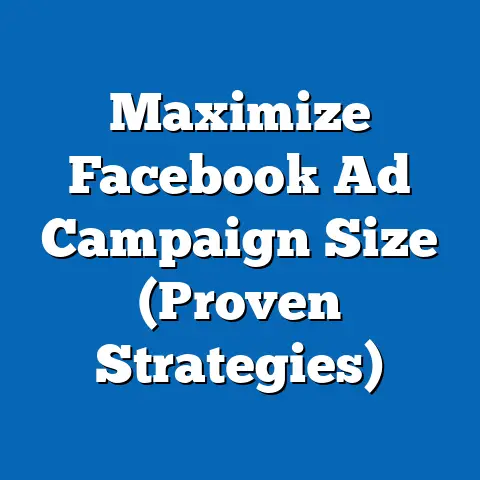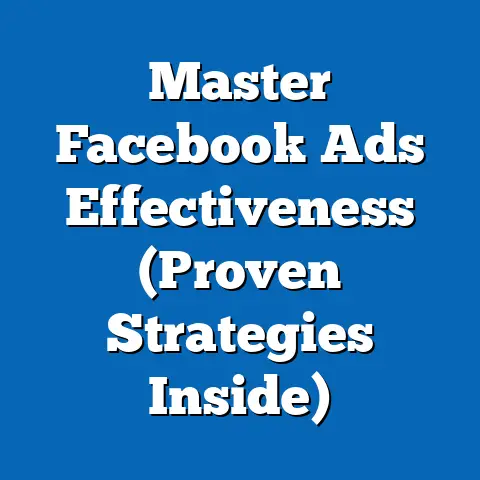Master Facebook Ad Account Verification (Proven Strategies)
Crafting a successful Facebook advertising campaign is an art.
As advertisers, we are artisans, meticulously shaping our strategies and ad creatives to resonate with our target audiences.
Just as a sculptor cherishes their tools, we must value and protect our Facebook ad accounts.
A crucial, often overlooked, step in this process is Facebook ad account verification.
It’s not just a formality; it’s the bedrock upon which your advertising success is built.
I’ve personally seen countless businesses struggle because they didn’t prioritize ad account verification.
They faced ad disapprovals, account suspensions, and ultimately, a significant loss of potential revenue.
That’s why I’m passionate about sharing proven strategies to navigate this process successfully.
A verified account not only enhances your credibility but also unlocks advanced features and minimizes the risk of disruptions.
Let’s dive into the world of Facebook ad account verification and discover how to master it.
Section 1: Understanding Facebook Ad Account Verification
Let’s start with the basics.
What exactly is Facebook ad account verification?
It’s the process of proving to Facebook that your business is legitimate and that you are who you say you are.
It’s like getting your advertising “passport” stamped, allowing you to operate with greater trust and access within the platform.
There are actually a couple of different types of verification you might encounter:
- Business Verification: This is the granddaddy of them all.
It involves verifying your entire business through Facebook Business Manager.
This requires submitting official documents that prove your business registration, address, and other key details. - Ad Account Verification: This is more specific and focuses on the ad account itself.
It might involve verifying your payment method or confirming your business details directly within the ad account settings.
Why is verification so important?
From my experience, the benefits of a verified account are manifold:
- Improved Trust with Customers: A verified badge signals to potential customers that you’re a legitimate business, increasing their confidence in your ads and offers.
Think of it as the online equivalent of a trusted storefront. - Access to Additional Features: Facebook often rolls out new features and targeting options to verified businesses first.
This gives you a competitive edge in reaching your ideal audience.
I’ve seen businesses gain access to beta programs and advanced targeting capabilities simply because they took the time to verify. - Better Ad Performance: Verified accounts often experience higher ad delivery and lower costs per result.
Facebook trusts verified businesses more, so they’re more likely to show your ads to a wider audience at a competitive price. - Reduced Risk of Account Suspension: This is perhaps the most critical benefit.
Unverified accounts are more susceptible to being flagged for policy violations and potential suspension.
Verification significantly reduces this risk, giving you peace of mind.
I’ve personally helped businesses recover their accounts after suspension, and in almost every case, a lack of verification was a contributing factor.
Common Misconceptions:
Let’s debunk some common myths:
- Myth: Verification Guarantees Ad Approval. Verification doesn’t give you a free pass to violate Facebook’s advertising policies.
Your ads still need to comply with all guidelines. - Myth: Verification is Only for Large Businesses. Small businesses and startups also benefit from verification.
In fact, it can be even more crucial for smaller businesses to establish trust with potential customers. - Myth: Verification is a One-Time Thing. Facebook may periodically request updated information or re-verification to ensure your business details are still accurate.
Key Takeaway: Facebook ad account verification is a vital step for any serious advertiser.
It builds trust, unlocks features, improves performance, and protects your account from suspension.
Don’t let these benefits pass you by.
Next Step: Evaluate whether you have completed the Business Verification process.
If not, this should be your immediate priority.
Section 2: Preparing for Verification
Okay, so you understand the importance of verification.
Now, how do you actually prepare for it?
Think of it like preparing for an audit – you need to get your house in order.
Here’s a breakdown of the necessary steps:
1. Ensure Compliance with Facebook’s Advertising Policies:
This is absolutely paramount.
Before you even think about verification, make sure your ads and landing pages are squeaky clean.
Scour through Facebook’s Advertising Policies (you can find them in the Facebook Business Help Center) and ensure you’re not violating any rules.
I’ve seen accounts rejected for verification simply because they were promoting products or services that were even subtly against the policies.
Pay close attention to rules regarding:
- Prohibited Content: This includes anything illegal, discriminatory, or harmful.
- Restricted Content: This includes things like alcohol, gambling, and health-related products, which require specific permissions and targeting limitations.
- Misleading or Deceptive Practices: This includes false claims, exaggerated promises, and bait-and-switch tactics.
2. Gather Required Documents:
Facebook will require you to submit official documents to verify your business.
The specific documents needed may vary depending on your business structure and location, but typically include:
- Business License or Registration Certificate: This proves that your business is legally registered in your country or region.
- Tax Identification Number (TIN) or Employer Identification Number (EIN): This verifies your business’s tax status.
- Utility Bill or Bank Statement: This confirms your business address.
Make sure the address on these documents matches the address you provide in your Business Manager.
3. Establish a Clear Business Presence:
Facebook wants to see that you’re a real, established business with a genuine presence online.
This means:
- Professional Website: Your website should be well-designed, informative, and easy to navigate.
It should clearly state your business name, address, and contact information.
I always recommend including an “About Us” page that tells your brand’s story and builds trust with visitors. - Active Social Media Profiles: Maintain active social media profiles on platforms relevant to your business.
Regularly post engaging content and interact with your audience.
This demonstrates that you’re actively engaged in your industry and building a community around your brand. - Consistent Branding: Ensure your branding (logo, colors, fonts) is consistent across all platforms, including your website, social media profiles, and ads.
This creates a cohesive and professional image.
4. Accurate and Consistent Information:
This is crucial.
The information you provide to Facebook during the verification process must match the information on your official documents and across your online presence.
Discrepancies can lead to rejection.
Double-check:
- Business Name: Ensure the name on your business license matches the name in your Business Manager.
- Address: Ensure the address on your utility bill matches the address in your Business Manager.
- Contact Information: Ensure the contact information on your website matches the contact information in your Business Manager.
What Facebook Looks For:
During the verification process, Facebook is primarily looking for proof that your business is legitimate, transparent, and compliant with its policies.
They want to see:
- Authenticity: That you are who you say you are.
- Transparency: That you are open and honest about your business practices.
- Compliance: That you adhere to Facebook’s advertising policies.
Tips for Presenting Information Effectively:
- Provide Clear and Legible Documents: Ensure your documents are scanned or photographed in high resolution and are easy to read.
- Highlight Relevant Information: If your document contains a lot of information, consider highlighting the specific details Facebook is looking for (e.g., business name, address, tax ID).
- Provide Additional Information When Necessary: If you believe your business situation requires further explanation, don’t hesitate to provide additional information or context in the notes section of the verification form.
Key Takeaway: Preparing for Facebook ad account verification requires careful attention to detail and a commitment to compliance.
Make sure your business is legitimate, your documents are in order, and your online presence is professional and consistent.
Next Step: Audit your current Facebook advertising campaigns and presence.
Ensure you are in compliance with Facebook’s advertising policies.
Section 3: Step-by-Step Verification Process
Now that you’ve prepared everything, let’s walk through the actual verification process.
I’ll guide you step-by-step, so you know exactly what to expect.
1. Accessing the Business Manager:
First, you’ll need to access your Facebook Business Manager.
Go to business.facebook.com and log in with your Facebook account.
2. Navigating to the Verification Section:
Once you’re in Business Manager, navigate to the “Security Center” section.
You can find this by clicking on the three horizontal lines in the top left corner, then scrolling down to “Business Settings,” and finally selecting “Security Center.”
3. Initiating the Verification Process:
In the Security Center, you’ll see a section labeled “Business Verification.” If your business hasn’t been verified yet, you’ll see a button that says “Start Verification.” Click this button to begin the process.
4. Submitting Necessary Documents and Information:
Facebook will guide you through a series of prompts, asking you to provide information about your business and upload the required documents.
Be prepared to provide:
- Business Details: Your business name, address, phone number, and website.
- Legal Name and Address: The legal name and address of your business as registered with your local government.
- Documentation: Upload clear and legible copies of your business license, tax ID, and utility bill.
5. What to Expect During the Verification Review Period:
After you submit your information, Facebook will review it.
This process can take anywhere from a few days to a few weeks, depending on the complexity of your business and the volume of verification requests they’re processing.
During this time, you may receive emails from Facebook requesting additional information or clarification.
Be sure to respond promptly and provide any requested information as accurately as possible.
Potential Pitfalls and How to Avoid Them:
- Incomplete or Inaccurate Information: This is the most common reason for rejection.
Double-check all information before submitting. - Unclear or Illegible Documents: Ensure your documents are scanned or photographed in high resolution and are easy to read.
- Mismatched Information: Ensure the information you provide to Facebook matches the information on your official documents and across your online presence.
- Policy Violations: If your ads or landing pages violate Facebook’s advertising policies, your verification request may be rejected.
Key Takeaway: The Facebook ad account verification process is straightforward, but it requires careful attention to detail.
Follow the steps outlined above, provide accurate information, and be prepared to respond to any requests from Facebook.
Next Step: Initiate the Facebook Business Verification process today.
Have your documents ready and be prepared to answer any questions Facebook has.
Section 4: Proven Strategies to Ensure Successful Verification
While the steps above are essential, there are some additional strategies you can employ to increase your chances of successful verification.
These are based on my experience and observations from working with numerous businesses.
1. Building a Positive Ad History:
Facebook is more likely to trust businesses with a history of running compliant ads.
Focus on creating high-quality, engaging ads that adhere to Facebook’s advertising policies.
- Avoid Sensationalism or Clickbait: Focus on providing genuine value to your audience.
- Be Transparent About Your Offers: Clearly state the terms and conditions of your promotions.
- Target Your Audience Appropriately: Ensure your ads are relevant to the interests and demographics of your target audience.
2. Proactive Communication with Facebook Support:
If you have any questions or concerns about the verification process, don’t hesitate to reach out to Facebook support.
They can provide guidance and clarification, helping you avoid potential pitfalls.
- Use the Facebook Business Help Center: This is a valuable resource for finding answers to common questions and troubleshooting issues.
- Contact Facebook Support Directly: You can contact Facebook support through the Business Help Center or by using the “Help” button in your Business Manager.
3. Leveraging Community Resources and Forums:
- Join Facebook Groups for Advertisers: These groups are a great place to ask questions, share experiences, and learn from others.
- Participate in Online Forums: Search for forums related to Facebook advertising and verification.
Case Studies:
Let’s look at a few examples of brands that successfully navigated the verification process:
- Example 1: A Local Restaurant: This restaurant focused on building a strong online presence with a professional website, active social media profiles, and positive customer reviews.
They also ensured their ads were compliant with Facebook’s advertising policies.
As a result, their verification request was approved quickly and easily. - Example 2: An E-Commerce Store: This store had initially struggled with verification due to inconsistencies in their business name and address.
They worked with Facebook support to resolve these issues and provide accurate documentation.
Their verification request was eventually approved after they corrected the discrepancies.
Key Takeaway: Successful Facebook ad account verification is not just about following the steps; it’s about building a trustworthy and transparent business.
By focusing on compliance, communication, and community, you can increase your chances of success.
Next Step: Join a Facebook group of advertisers and learn from the experiences of others.
Conclusion
Mastering Facebook ad account verification is a crucial step in the journey of successful digital advertising.
It’s not just a formality; it’s the foundation upon which you build trust, unlock features, improve performance, and protect your account.
By approaching the verification process with the same craftsmanship and attention to detail that you would apply to your ad campaigns, you can enhance your credibility, improve your ad performance, and ultimately achieve your marketing goals.
Remember, your Facebook ad account is a valuable tool, and verification is the key to unlocking its full potential.
So, take the time to prepare, follow the steps, and implement the strategies outlined in this guide.
Your advertising success depends on it!






